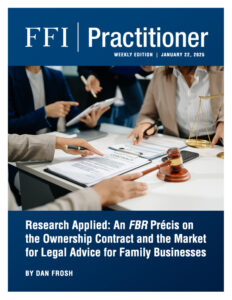
View this edition in our enhanced digital edition format with supporting visual insight and information.
Thank you to FFI Fellow Dan Frosh for this précis of “Legal Advisors and Family Business Owners: A Transaction Cost Understanding of ‘the Ownership Contract.” The article appears in the June 2024 issue of Family Business Review. In the précis, Dan provides a summary of the research and key findings, and he explores practical implications of the research for families, advisors, and researchers in the field.
Introduction
Family businesses owners, much like their non-family counterparts, depend upon competent legal advice to help them effectively prepare for and navigate changes in ownership. However, family businesses often face increased challenges related to ownership regulation and governance, stemming from the hybrid nature of family businesses, where family dynamics and values intersect with business objectives and profit motives.1
Despite the availability of legal instruments designed to help safeguard ownership transitions, many family enterprises—particularly small and medium-sized businesses—underutilize them. According to the respondents of several recent studies:
- 68% of owners lack a buy-sell agreement
- 51% of owners lack an estate plan for dividing business assets
- 64% of owners lack life insurance policies2
- 85% of enterprising families lack a conflict resolution mechanism for family disputes3
These statistics help to illustrate the alarming underuse of available legal advice and instruments by family business owners, which can leave these enterprises vulnerable to unforeseen challenges.
In their recent FBR article titled “Legal Advisors and Family Business Owners: A Transaction Cost Understanding of ‘the Ownership Contract,’”4 Kajsa Haag, Hanna Almlöf, Marina B. Madsen, and Mette Neville investigate the market for legal advice in family businesses, identifying specific ownership-related costs that deter owners from formalizing their ownership governance and regulation. This reluctance to incur preventive ex ante costs significantly heightens the risk of substantial ex post costs, potentially threatening the long-term stability and survival of the business.
This problem is compounded by the complex dynamics of family and business systems and the high costs—both monetary and emotional—associated with legal consultation. The authors aim to understand these dynamics through the lens of transaction cost economics, introducing the concept of the “ownership contract,” which encompasses both formal legal agreements and informal understandings among family shareholders.
The findings of this study, which was focused on owners of small and medium enterprises (SMEs) and legal advisors in Sweden and Denmark, have relevance for family business advisors around the world, who are often tasked with guiding these enterprises through complex legal landscapes. By exploring the factors that deter family business owners from seeking comprehensive legal advice, the research offers valuable insights for advisors aiming to enhance their services and for family businesses striving to safeguard their future.
Methodology
The research team adopted a multidisciplinary and mixed-methods approach, blending business administration and legal perspectives. The research design included qualitative in-depth interviews and a quantitative survey to provide a comprehensive understanding of the issue.
- In-Depth Interviews: The authors conducted 30 interviews with legal advisors and nine with family business owners in Sweden and Denmark. Legal advisors were chosen based on their experience in providing legal services to family business owners, with a focus on both family and business law. The family business owners selected were involved in SMEs with multiple co-owners, a context that necessitates collaboration and ownership regulation.
- Survey: An online survey gathered responses from 105 family business owners to assess their use of legal instruments for ownership regulation. The survey captured a broad perspective on the extent of formal ownership regulation and the role of advisors.
- Data Analysis: Following the data collection, the research team analyzed the survey results and interview transcripts, identifying patterns and themes that emerged from the data. The theoretical framework of transaction cost economics provided a lens through which the findings were interpreted.
Key Findings: Impeding Factors
Based on this research and analysis, the study’s authors identified several critical factors that impede family business owners from obtaining effective legal advice about governing the ownership of their enterprises. In particular, the researchers found that in most cases, family business owners receive only partial advice, primarily covering either business law or family law, which led the team to focus their analysis on factors that could explain this trend.
These factors were categorized into two main areas: supply-side challenges related to legal advisors and the market for legal advice and demand-side challenges stemming from family business owners.
Supply-Side Challenges: Legal advisors and the scattered market for legal advice
Examining the supply-side challenges, the researchers identified the following impeding factors caused by the market for legal services in Sweden and Denmark:
- Compartmentalized Expertise: Legal advisors often specialize in either family law or business law, with few offering integrated expertise. This specialization leads to fragmented advice, as family business owners require comprehensive solutions spanning both legal domains. For example, while a business law advisor may draft a shareholder agreement, they may overlook or lack expertise regarding important nuances of effective marital agreements or estate planning instruments, which can be critical in regulating ownership transfers in family enterprises.
- Professional Identity and Prestige: The researchers found that the legal profession tends to prioritize business law over family law due to perceived prestige and higher financial rewards. This professional bias discourages business lawyers from engaging in family law matters, leaving family businesses underserved in critical areas of ownership regulation.
- Institutional Barriers: Regulatory restrictions in certain regions also can further exacerbate the fragmentation of legal services. In Sweden, for instance, the researchers explain that accounting firms are prohibited from offering family law advice, even though they often serve as primary advisors to family businesses. This institutional interference forces family business owners to seek multiple advisors, increasing costs and complicating the advisory process.
- Bounded Assignments: The structure of many legal engagements cause legal advisors to focus narrowly on their specific assignments without being able to consider broader implications or the tangentially related risks that may exist. This compartmentalization leads to incomplete governance frameworks, as these advisors may refrain from coordinating with specialists from other legal domains outside the boundaries of their current engagement. Consequently, family business owners often receive piecemeal advice, leaving critical aspects of ownership regulation unaddressed.
Demand-Side Challenges: Family Business Owners
The authors also identified the following demand-side related challenges caused by the behavior of family business owners as customers of legal services:
- Information Asymmetry: Family business owners often lack both the awareness of and legal knowledge necessary to evaluate their regulatory and governance needs. Many are unaware of the complexities involved in ownership regulation and rely heavily on their advisors for guidance. However, this reliance can be problematic when their advisors offer fragmented services, as owners cannot assess the completeness or quality of the advice they receive.
- Present Biasedness: The tendency to prioritize immediate costs and benefits over long-term planning5 can deter family business owners from investing in comprehensive legal services. This “present biasedness” leads them to delay or avoid formal ownership regulation, even when they recognize the risk of severe future consequences.
- Emotional Strain: Comprehensive ownership regulation often involves deep discussions about sensitive topics including family conflict, death, and divorce, which can cause emotional discomfort for family business owners. This strain discourages owners from addressing these issues with their legal advisors, resulting in a lack of formal agreements. For example, the researchers found that, while “more than 70% [of the business owners surveyed] reported that decision-making power, veto rights, and business strategy were discussed, merely 28% covered testaments for the situation if one of the co-owners was deceased… only 44% touched upon what would happen if one of the co-owners got a divorce…”6
Implications for Family Business Advisors
The findings underscore the need for family business advisors to help their clients understand the importance of investing the time and resources to addressing these important ownership governance concerns. To do so, advisors can:
- Raise their clients’ awareness about the long-term risks of neglecting ownership regulation and emphasize the importance of proactive planning.
- Assemble multidisciplinary advisory teams to offer comprehensive solutions, reducing the transaction costs associated with consulting multiple specialists. By fostering collaboration among legal, financial, and family governance experts, advisors can provide more cohesive and effective guidance, thereby enhancing client trust and satisfaction.
- Work with clients to understand and address the emotional barriers that deter family business owners from engaging in formal ownership planning. Sensitivity to family dynamics and effective communication strategies can help advisors navigate these challenges and encourage clients to adopt preventive legal measures.
- Develop their own knowledge of ownership governance practices and agreements to help their clients to better articulate their needs and identify the right team of legal advisors to provide holistic solutions.
Implications for Family Business Owners
The findings of this research also offer the following lessons for family business owners:
- Family business owners must recognize the importance of formal ownership regulation in safeguarding their enterprise’s continuity and stability. This study highlights the risks associated with informal agreements and the need for comprehensive legal frameworks to manage ownership transitions effectively.
- Owners interested in achieving enduring multigenerational success for their enterprise should prioritize developing at least a high-level understanding of their ownership governance needs and legal options in order to properly engage advisors who can offer the integrated solutions they seek.
- Overcoming the emotional strain of discussing potentially sensitive topics and the willingness to invest today in solutions for the future are both essential to ensure that ownership regulation is addressed proactively rather than reactively. By doing so, family business owners can prevent costly disputes and ensure smoother generational transitions.
Implications for Applied Research
- As the researchers note, this study had a limited focus on owners and legal advisors in Sweden and Denmark. Further research outside of Scandinavia would be useful to test the global applicability to the findings of this research.
- This research was also focused on SMEs with a maximum of five owners. It would be beneficial to the field to expand this research to include larger family businesses with increased ownership and family complexity to explore the applicability of the findings on these enterprising families.
- Future research on families with members in different jurisdictions or who own businesses operating in multiple jurisdictions would be interesting to see how these added complexities impact the family’s willingness to invest in comprehensive legal advice around planning for ownership governance.
Conclusion
This research provides a nuanced understanding of the challenges family businesses face in regulating ownership changes. By applying transaction cost economics, the study identifies both supply-side and demand-side impediments that hinder effective legal consultation. These findings offer valuable insights for family business advisors and owners, emphasizing the need for holistic advisory approaches and proactive legal planning.
References
1 Boers, Börje, and Mattias Nordqvist. “Family Businesses as Hybrid Organisations.” In Handbook on Hybrid Organisations, edited by David Billis, Colin Rochester. Edward Elgar Publishing, 2020; Whetten, David, Peter Foreman, and W. Gibb Dyer. “Organizational Identity and Family Business.” In The SAGE Handbook of Family Business, edited by Leif Melin, Mattias Nordqvist, and Pramodita Sharma. SAGE, 2014.
2 MassMutual. 2022 Business Owner Perspectives Study. 2022. https://www.massmutual.com/global/media/shared/doc/sb1020_2022.pdf
3 PwC. PwC’s 11th Global Family Business Survey: Transform to Build Trust. 2023. https://www.pwc.com/gx/en/family-business-services/family-business-survey-2023/download/PwC-FamilyBusinessSurvey-v03.1.pdf
4 Haag, Kajsa, Hanna Almlöf, Marina B. Madsen, and Mette Neville. “Legal Advisors and Family Business Owners: A Transaction Cost Understanding of ‘the Ownership Contract.’” Family Business Review 37, no. 2 (2024): 292-314. https://doi.org/10.1177/08944865231217882.
5 Cartwright, Edward. Behavioral Economics (2nd ed.). Taylor & Francis, 2014.
6 Haag, et al., 305.
–
Disclaimer: The views expressed in this article are those of the author only. The information contained in this article is provided solely for informational purposes. This article does not constitute legal advice or create an attorney-client relationship. Because of the generality of this article, the information provided herein may not be applicable in all situations or in all jurisdictions and should not be acted upon without specific legal advice from a licensed attorney based on particular situations.
About the Contributor

Dan Frosh, FFI Fellow, is a director at the Merrill Center for Family Wealth® where he works with enterprising families to help empower them to navigate the complexities of wealth and family dynamics to help achieve enduring multigenerational success. Dan is an attorney and before joining Merrill, he served as a senior advisor at Cambridge Family Enterprise Group (CFEG). Dan writes and speaks internationally on topics relating to family enterprises and wealth and has served as a facilitator in the Future Family Enterprise program at the MIT Sloan School of Management. Dan is the current vice chair of the FFI board of directors and serves as the consulting editor for FFI Practitioner. Dan does not provide legal advice in his role with Merrill.

View this edition in our enhanced digital edition format with supporting visual insight and information.





